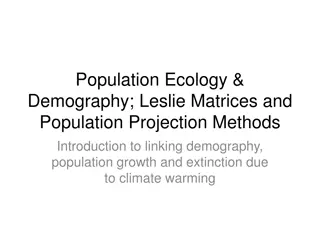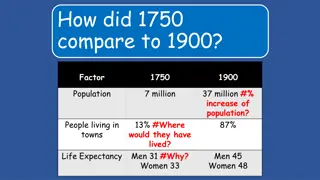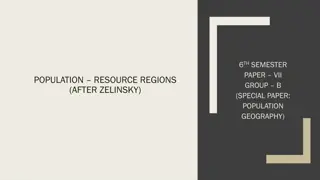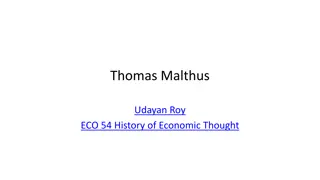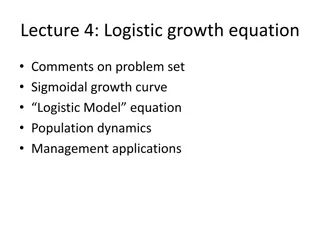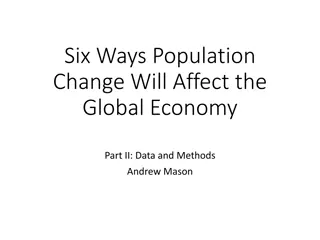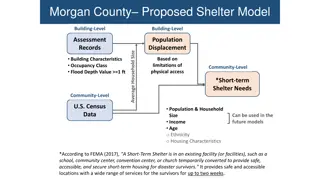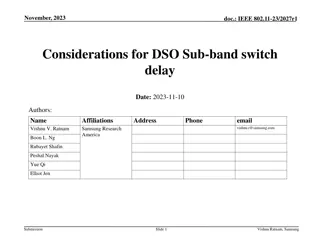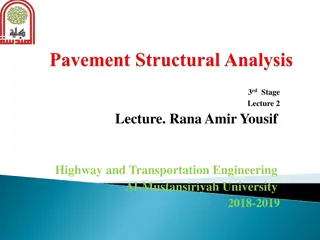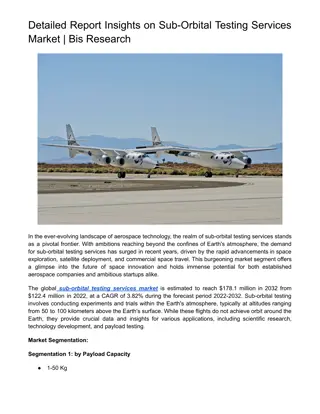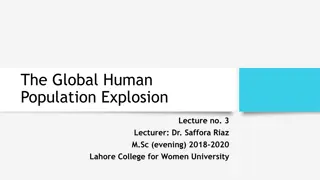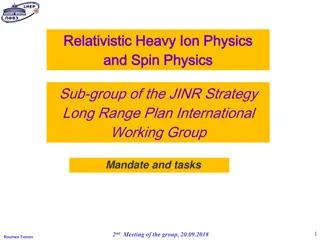Overview of the South African National Population Register
The South African National Population Register (NPR) is a vital system maintained by the Department of Home Affairs. It serves to record and update information on the country's resident population, issue identity documents, and handle related administrative tasks. The NPR has evolved over the years
2 views • 16 slides
Tamil Nadu Uniformed Service Recruitment Board (TNUSRB)
Tamil Nadu Uniformed Service Recruitment Board (TNUSRB) \nTamil Nadu Uniformed Services Recruitment Board (TNUSRB) was established in 1991 by the Government of Tamil Nadu to recruit individuals for the state\u2019s uniformed services, which include the Police, Prison, and Fire and Rescue Services.\
6 views • 5 slides
Understanding Population Ecology and Demography Through Leslie Matrices
Explore the critical aspects of population ecology and demography, focusing on factors influencing abundance, population growth, regulation, and the impacts of climate change. Learn about population projections, growth models, age-structured populations, and data requirements for estimating populati
4 views • 35 slides
Impact of Human Population Growth on Environment and Welfare
The rapid growth of the human population is placing immense pressure on the environment, leading to increased demand for resources like food, water, and shelter. The effects of human activity on the environment have escalated significantly over the years due to population expansion. High birth rates
0 views • 8 slides
Understanding Sub-Letting in Rental Properties
Assured tenancies come with a statutory prohibition on sub-letting under the Housing Act 1988. If a tenant sub-lets, they breach their contract with the landlord, potentially leading to possession orders. The sub-tenants have a legal status, but the contractual relationship for paying rent lies with
0 views • 18 slides
Guidelines for Media Reporting on Gender-Based Violence: Roles and Functions of GBV Sub-Cluster
Comprehensive guidelines for media reporting on Gender-Based Violence (GBV) covering the roles and responsibilities of the GBV Sub-Cluster, the coordination structure, functions of the GBV Sub-Cluster, and basic concepts of GBV including different forms of violence. The document emphasizes the impor
2 views • 36 slides
Introduction to Sampling in Statistics
Sampling in statistics involves selecting a subset of individuals from a population to gather information, as it is often impractical to study the entire population. This method helps in estimating population characteristics, although it comes with inherent sampling errors. Parameters represent popu
2 views • 24 slides
Understanding Population-Resource-Region Relationship: A Geographical Perspective
Explore the intricate relationship between population, resources, and regions through a geographical lens. Delve into classifications based on population, resources, and technology, with examples from different countries and regions. Discover the concepts of optimum population, over-population, and
1 views • 11 slides
Understanding Demography: Population Trends and Analysis
Demography is the study of population size, distribution, and composition, encompassing elements such as mortality, natality, migration, and demographic forces. Population census plays a crucial role in collecting and analyzing demographic data, with methods like De Jure and De Facto census. Inter-c
6 views • 21 slides
Comparing 1750 to 1900: Population Growth in Britain
The population of Britain saw a significant increase between 1750 and 1900. In 1750, the population was 7 million, and by 1900, it had grown to 37 million. This represented an 87% increase. The number of people living in towns also rose from 13% to a higher percentage. Factors contributing to this g
0 views • 6 slides
Population Resource Regions and Zelinsky's Classification
Geographers have long studied the relationship between population growth and resource adequacy, leading to the concept of Population Resource Regions (PRR) by W. Zelinsky. Zelinsky identified five types of PRR based on population-resource ratios, ranging from Type A with high resource utilization po
0 views • 8 slides
Population Distribution in Different Regions of Pakistan
The population distribution in Pakistan varies significantly among different regions, with certain provinces like Punjab and Sindh having higher population densities compared to Baluchistan and FATA. The rural areas are also categorized into different population density regions based on the number o
0 views • 14 slides
Sub-National Coordination: Benefits and Implementation
Sub-national coordination allows for decentralized decision-making, close cooperation with stakeholders, and increased community involvement. This approach ensures quick response times, adaptation to local circumstances, and enhanced accountability to affected populations. Learn about the roles, adv
0 views • 7 slides
Methods of Population Forecasting for Urban Development
Designing water supply and sanitation schemes for cities requires accurate population forecasting. Factors influencing population changes include births, deaths, migration, and annexation. Various methods like Arithmetic Increase, Geometric Increase, and Ratio Method are used to predict population g
4 views • 24 slides
Key Characteristics of Fungal Divisions and Sub-Divisions
Identification key for important characteristics of fungal divisions and sub-divisions, including Myxomycota and Eumycota, with detailed descriptions of sub-divisions such as Mastigomycotina, Zygomycotina, Ascomycotina, Basidiomycotina, and Deuteromycotina. Focus on distinguishing features, reproduc
0 views • 13 slides
Understanding the Concept of Population and Unit Stock
The concept of population revolves around all organisms of the same species living in a specific area capable of interbreeding. It is essential to differentiate between sample populations and real populations to accurately study their attributes such as birth rates, death rates, and spatial dimensio
0 views • 15 slides
Population Policy of Pakistan: Vision, Goals, and Strategies
The Population Policy of Pakistan, adopted in 2002, aims to stabilize the population by 2020 through a focus on reducing fertility rates and promoting family planning. The policy outlines goals such as achieving a balance between resources and population, increasing awareness of rapid population gro
0 views • 11 slides
Exploring Population Data of the Czech Republic
The data presents insights into the population of the Czech Republic, including demographics, language distribution, religious beliefs, literacy rates, life expectancy, and urban population percentages. The population pyramid reveals a dominance of people in the age group of 20-49, with longer life
0 views • 8 slides
Thomas Malthus and His Theory on Population Growth
Thomas Robert Malthus, an influential economist, proposed a theory on population growth in the 18th century. His theory suggested that population grows exponentially while food production increases at a slower rate, leading to inevitable food scarcity. Malthus also discussed the concept of preventiv
2 views • 19 slides
Reassessing Scholarly and Sub-Scientific Mathematical Cultures
Scholarly and sub-scientific mathematical cultures are reevaluated through the works of Jens Hoyrup, focusing on the organized nature of sub-scientific knowledge. The distinction between theoretical and practical knowledge, applications to mathematical cultures, and misconceptions related to the sup
0 views • 53 slides
Enhancing Corpus Analysis: Text and Sub-text Level Analysis
This study delves into the importance of improving text and sub-text level analysis of corpora, highlighting traditional approaches, current tools, challenges, and the necessity for effective database design. It emphasizes the need for user-friendly solutions to enhance research capabilities.
0 views • 19 slides
Louisiana Parish Population Statistics 2010
Louisiana Parish Population Statistics for the year 2010 reveal varying population numbers across different regions. The data provides insights into demographic changes and trends over the past decade. The total population change by parish and age group highlights shifts in different age brackets. T
0 views • 42 slides
Improvement of Population and Vital Statistics Metadata in the Demographic Yearbook System
The Demographic Yearbook system focuses on enhancing population and vital statistics metadata to ensure accurate and concise reflection of population concepts across 230+ countries. It involves annual collection of official national population estimates, vital statistics, and UN international travel
0 views • 16 slides
Classification of Class Aves and its Sub-Classes
Class Aves is divided into two sub-classes based on characteristics like teeth, claws, and bone structure. The sub-classes are Archaeornithes and Neornithes, each with distinct features and orders. Archaeornithes include the extinct order Archaeopterigiforms, exhibiting reptilian and avian traits. N
0 views • 13 slides
Understanding Logistic Growth in Population Dynamics
Explore the logistic growth equation and its applications in modeling population dynamics. Dive into the concept of sigmoidal growth curves and the logistic model, which reflects population growth with limits. Learn how to calculate population change using the logistic growth equation and understand
0 views • 26 slides
Impact of Population Change on Global Economy: Data Analysis
This paper by Mason, Lee, and members of the NTA Network discusses the impact of population change on the global economy. It provides technical details on constructing measures for individual countries using population data and National Transfer Accounts data. The measures covered include effective
0 views • 6 slides
Insights on 2019 Gender and Veteran Demographics
Analysis from the 2019 Annual Averages of the Current Population Survey reveals significant statistics regarding gender and veteran populations in the United States. Data indicates that veterans comprise 7.5% of the overall population, with women veterans totaling almost 2 million. Women veterans ma
0 views • 48 slides
Overview of Population Measures and District Data from Census Reports
The census reports various population measures including total population, voting age population, and citizen voting age population. The data includes breakdowns by ethnicity for each trustee district. Changes in voting and citizen voting age population percentages are also provided. Data is sourced
0 views • 4 slides
Adolescent Fertility Trends in Sub-Saharan Africa: A Critical Analysis
Investigating adolescent fertility rates in Sub-Saharan Africa reveals disparities in existing measurements and raises questions about the relationship between adolescent birth rates, unmet needs for contraception, and gender equity. Utilizing data from Health and Demographic Surveillance Systems al
0 views • 21 slides
Morgan County Proposed Shelter Model and Displacement Analysis
The content discusses the proposed shelter model for Morgan County, focusing on building-level assessment records, population displacement, average household size, and building characteristics. It also explains the calculations for population displacement due to flooding, emphasizing short-term shel
0 views • 8 slides
Understanding Population Pyramids for Analyzing Population Trends
Population pyramids are graphical illustrations that showcase the distribution of age groups within a population, segmented by gender. By observing and documenting the patterns of population pyramids, one can discern trends such as rapid growth, slow growth, or negative growth, which are influenced
0 views • 7 slides
The Importance of Sub-Editing in Journalism
Sub-editing plays a crucial role in journalism by enhancing news stories for clarity, accuracy, and readability. Reporters provide the content, but sub-editors refine it to align with publication policies and style. Editing involves more than just fixing grammar and factual errors; it shapes the ess
0 views • 15 slides
Considerations for Dynamic Sub-band Operation Switch Delay in IEEE 802.11-23/2027r1
This document addresses issues related to sub-band switch delay in Dynamic Sub-band Operation (DSO) within IEEE 802.11-23/2027r1. It proposes strategies like no-ACK initial control frames and follow-up frames to manage channel reservations for DSO sub-band switches efficiently.
0 views • 14 slides
Europe Sub-Orbital Testing Services Market Forecast & Opportunities
The Europe sub-orbital testing services market is estimated to reach $30.7 million by 2032 from $16.4 million in 2022, at a CAGR of 6.48% during the forecast period 2022-2032.\n\nRead Report Overview: \/\/bisresearch.com\/industry-report\/europe-sub-
1 views • 3 slides
Understanding LEADER Programme and Sub-Regional Areas in Ireland
LEADER Programme in Ireland is a key element of the Rural Development Policy 2021-2025, focusing on bottom-up, community-led approaches for rural development. It is delivered across 28 sub-regional areas, excluding main cities, through Local Action Groups implementing Local Development Strategies. S
0 views • 16 slides
Maine Workforce and Population Trends Analysis 2014-2024
Maine's workforce and population outlook from 2014 to 2024 reveals a decline in births, resulting in an aging population and workforce imbalance. The state faces challenges due to low birth rates, negative natural population change, and minimal net migration, impacting labor force growth and total p
0 views • 31 slides
Understanding Typical Layers of Flexible Pavement in Highway Engineering
The typical layers of a conventional flexible pavement include seal coat, surface course, tack coat, binder course, prime coat, base course, sub-base course, compacted sub-grade, and natural sub-grade. Each layer serves a specific purpose in providing strength, durability, and drainage characteristi
0 views • 9 slides
Sub-Orbital Testing Services Market
The global sub-orbital testing services market is estimated to reach $178.1 million in 2032 from $122.4 million in 2022, at a CAGR of 3.82% during the forecast period 2022-2032.\n\nRead Report Overview: \/\/bisresearch.com\/industry-report\/sub-orbit
1 views • 3 slides
The Global Human Population Explosion: Causes and Implications
The lecture explores the rapid increase in the global human population post-World War II, analyzing factors such as birth rates, mortality rates, and life expectancy. Various counterarguments are presented, including the debate on population growth benefits, ethical concerns over reproductive interf
0 views • 20 slides
Relativistic Heavy-Ion and Spin Physics Sub-group Mandate and Tasks
The Relativistic Heavy-Ion and Spin Physics Sub-group, part of the JINR Strategic Long-Range Plan, is tasked with identifying scientific priorities and research infrastructure to maintain JINR's global scientific leadership. Members include experts from various institutions collaborating to develop
0 views • 8 slides

